GCSEs (General Certificate of Secondary Education) are UK qualifications typically taken at age 14 to 16 (Years 10-11). Students study a mix of core and optional subjects, are assessed mainly by end-of-course exams with some non-exam assessment (NEA) in certain subjects, and receive grades on different scales depending on where they sit the exams. Your GCSEs significantly influence your entry to sixth form/college, apprenticeships, and future study opportunities.
Still confuse how do GCSEs works? This guide explains what GCSEs are, who takes them, how they’re assessed, how the grading works (9 – 1 vs A – G), how many to choose, GCSE results, resits,* and options for private/adult learners all in one place.
Note: The GCSE system is changing fast. For a breakdown of upcoming reforms, including extended formula sheets, digital exam pilots, and broader curriculum review. Check out our GCSE Reform & Exam Changes 2025-27 guide.
Jump To Section
What is GCSE in UK

GCSEs are subject-by-subject qualifications that mark the end of Key Stage 4 in secondary school. You usually study them over two years and sit the exams in May – June of Year 11.
- Typical age: 14 to 16
- Where they are offered: England, Wales, Northern Ireland (and as International GCSEs overseas)
- Exam boards: AQA, Edexcel (Pearson), OCR, WJEC/Eduqas (Wales), and CCEA (Northern Ireland)
Adults can also take GCSEs later to meet job, training, or university requirements.
Book a Free 1-on-1 Session with Our Tutor
- Best tutors in the UK
- Personalized learning plans
- Flexible online scheduling
Core vs Optional GCSE Subjects
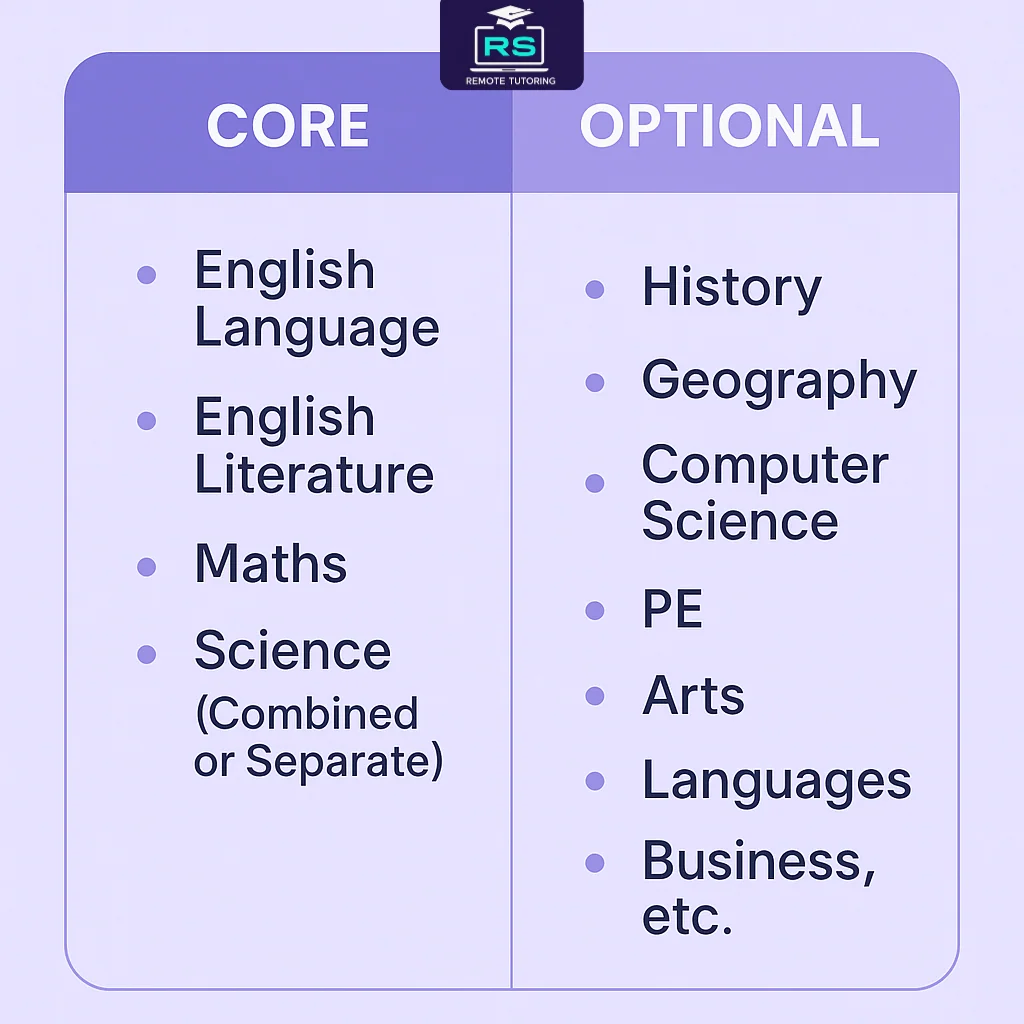
Most students take 8 to 10 GCSEs. Every school sets its own programme, but broadly:
Core (usually required):
- English Language (English Literature)
- Mathematics
- Science (as Combined Science or separate sciences: Biology, Chemistry, Physics)
GCSE Optional Subjects:
History, Geography, Computer Science, Religious Studies, Art & Design, Music, Drama, PE, Business, Design & Technology, and languages (French, Spanish, German, etc.).
EBacc (English Baccalaureate) is a performance measure for schools encouraging a set of academic subjects, English, Maths, Sciences, a language, and History or Geography.
How Do GCSEs Work?
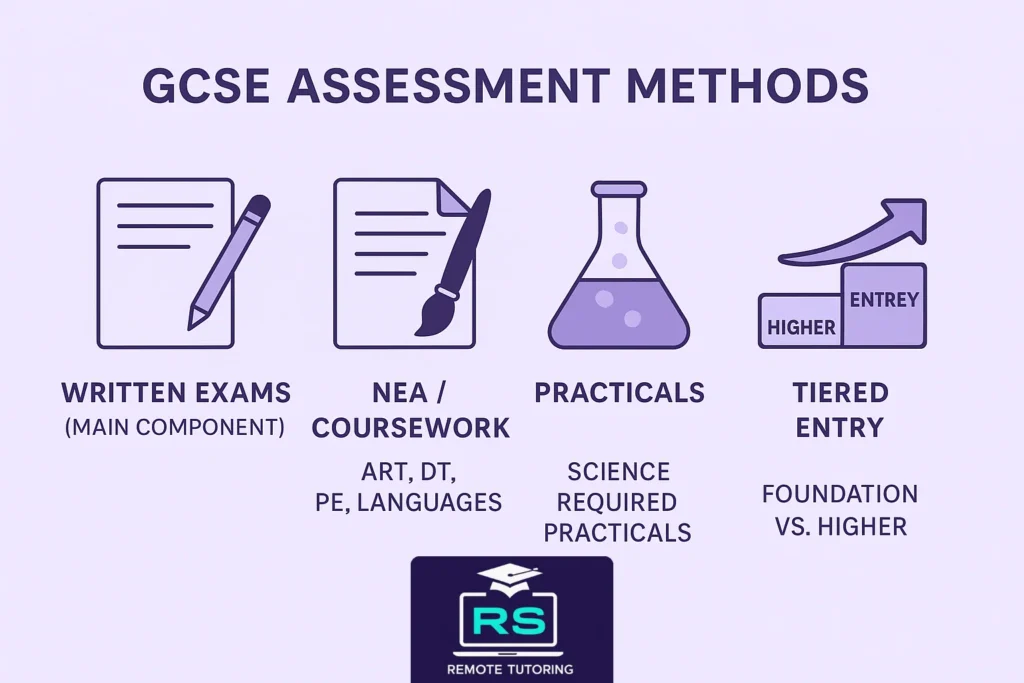
1) Written exams (the main component)
Most GCSEs are assessed by final exams taken at the end of the course (Year 11). Papers are marked externally by your exam board.
2) Non-Exam Assessment (NEA) or practicals (subject-dependent)
Some subjects include assessed coursework or practical components, for example:
- Art & Design (portfolio/NEA)
- Design & Technology (design project NEA)
- PE (practical performance and analysis)
- Modern languages (speaking assessments)
- Sciences (required practical activities)
Note: Sciences is assessed in written exams. Schools provide NEA task according to board rules, exam boards moderate marks. Check NEA Sample Guide.
3) Tiered entry (selected subjects)
In Maths and some Science courses, you may enter Foundation (grades 1 to 5 available) or Higher (grades 4 to 9 available). Your teacher will guide which tier matches your performance.
GCSE Grading: 9-1 vs A*-G
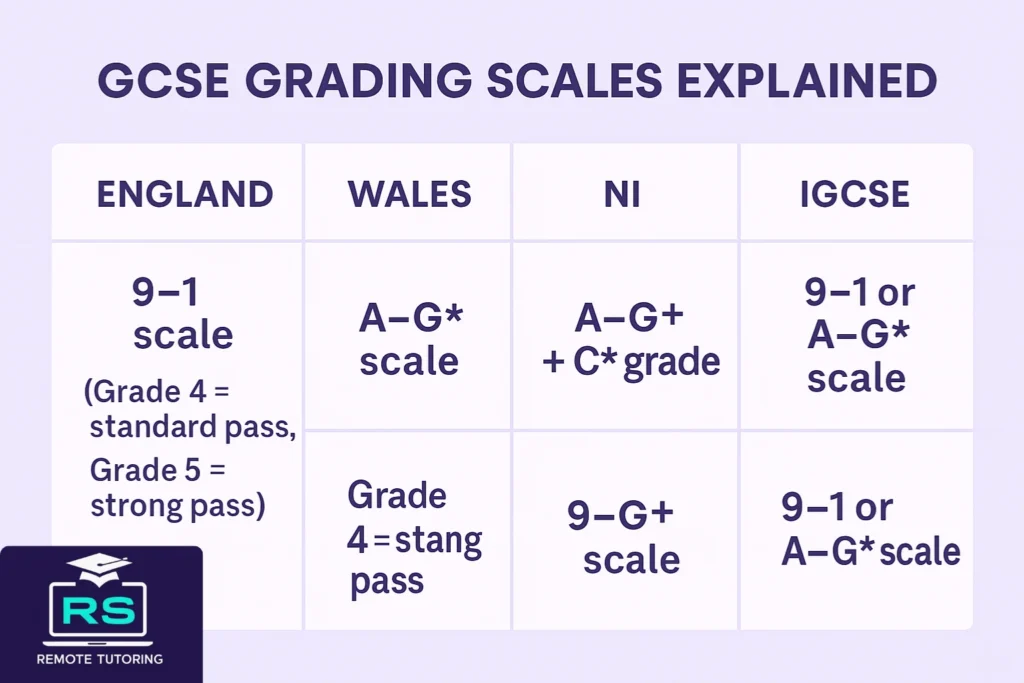
England:
- 9 to 1 scale, where 9 is highest.
- Grade 4 = standard pass; Grade 5 = strong pass.
- Employers/colleges often ask for at least Grade 4 in English and Maths.
Wales:
- Most GCSEs use A to G*. Some centres may also use English boards (9–1) for specific entries.
Northern Ireland:
- A to G* scale with an additional C* grade (between C and B). Some schools also enter candidates for English boards (9–1).
International GCSEs (IGCSEs):
- Run by Pearson Edexcel and Cambridge, grading can be 9–1 or A–G* depending on specification.
Grade boundaries (the marks needed for each grade) are set after marking each series and vary slightly per paper/board. They’re published on results day.
When Are GCSE Exams and Results?
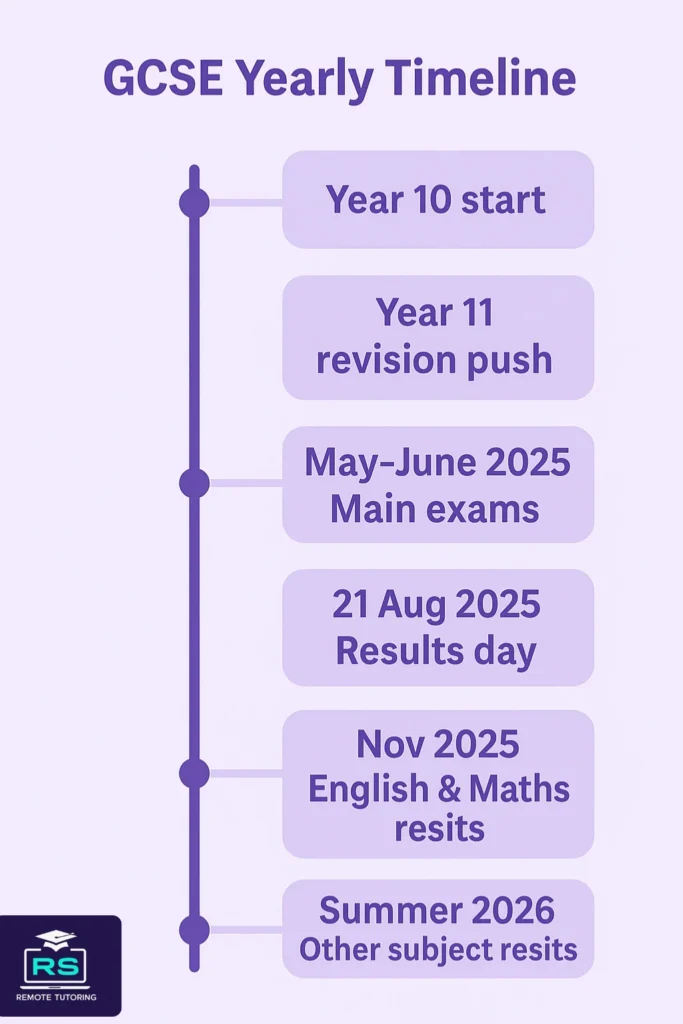
- Main exams: May – June 2025 (exact dates depend on your board’s timetable)
- what time are gcse results released: Thursday, 21 August 2025
- How to get GCSE results: In person at school/college from the morning; some schools also release results online via portals or secure apps.
How Many GCSEs Should You Take?
Most students take 8 to 10. Balance matters:
- Keep English, Maths, Science strong.
- Choose options you enjoy and that support your future plans (A-levels, T Levels/BTECs, or apprenticeships).
- Avoid over-loading, depth beats sheer quantity when it comes to grades.
Why GCSEs Matter (and how long they last)
- Post-16 pathways: Sixth form and colleges set entry requirements (often a minimum number of passes and specific grades for chosen A-levels or BTECs/T Levels).
- University and careers: Many universities and employers place particular emphasis on English and Maths.
- For life: GCSEs sit on your record; strong results keep future doors open.
Private Candidates & Adult Learners
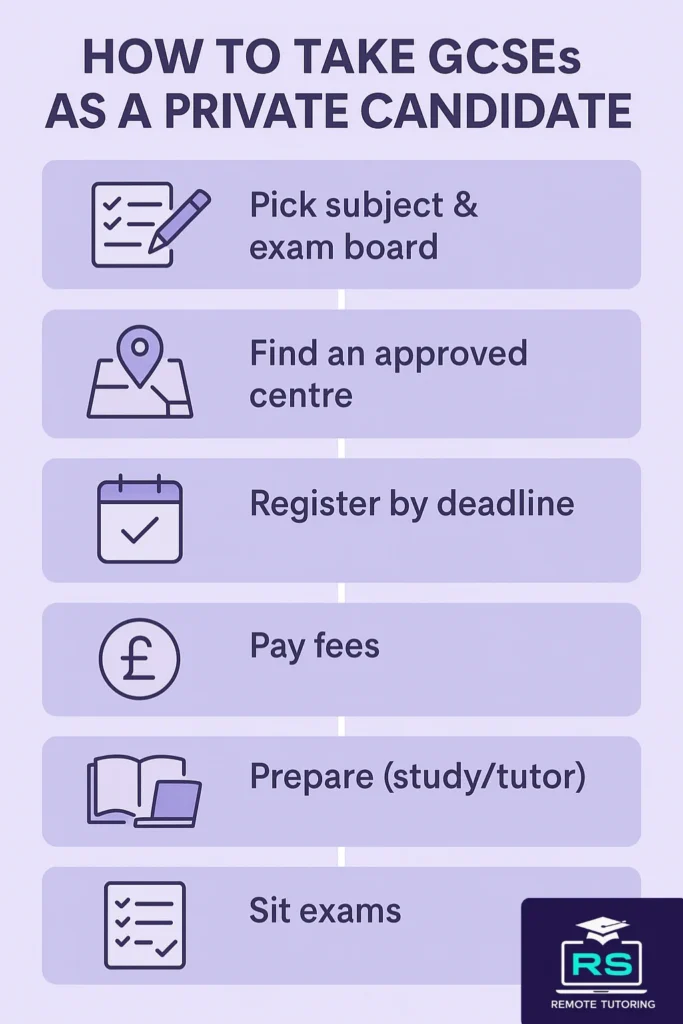
You can take GCSEs outside school as a private candidate:
- Pick your exam board/specification (e.g., AQA GCSE Maths).
Find an approved centre that accepts private candidates (search local colleges or private exam centres). - Register by the deadline (centres publish entry cut-offs; late entries incur fees).
- Pay fees (centre admin + exam fee per subject).
- Prepare (self-study, online courses, or tutoring).
Note: Costs vary by board/centre/subject. Budget for the exam entry plus any centre administration fee. If you need coursework/NEA, check whether your chosen specification allows private candidates (many NEA subjects are school-based consider alternatives like IGCSEs with exam-only routes).
Special Cases: Short Course, Applied & International
- Short-course GCSEs: Half-GCSEs (often used for RS/RE or other subjects), offering a compact syllabus.
- Applied GCSEs (where offered): More hands-on, vocationally-oriented GCSEs in some regions.
- IGCSEs: Widely taken by international and private candidates; content and assessment style suit independent study and some have no NEA.
If You Don’t Get the Grades You Need
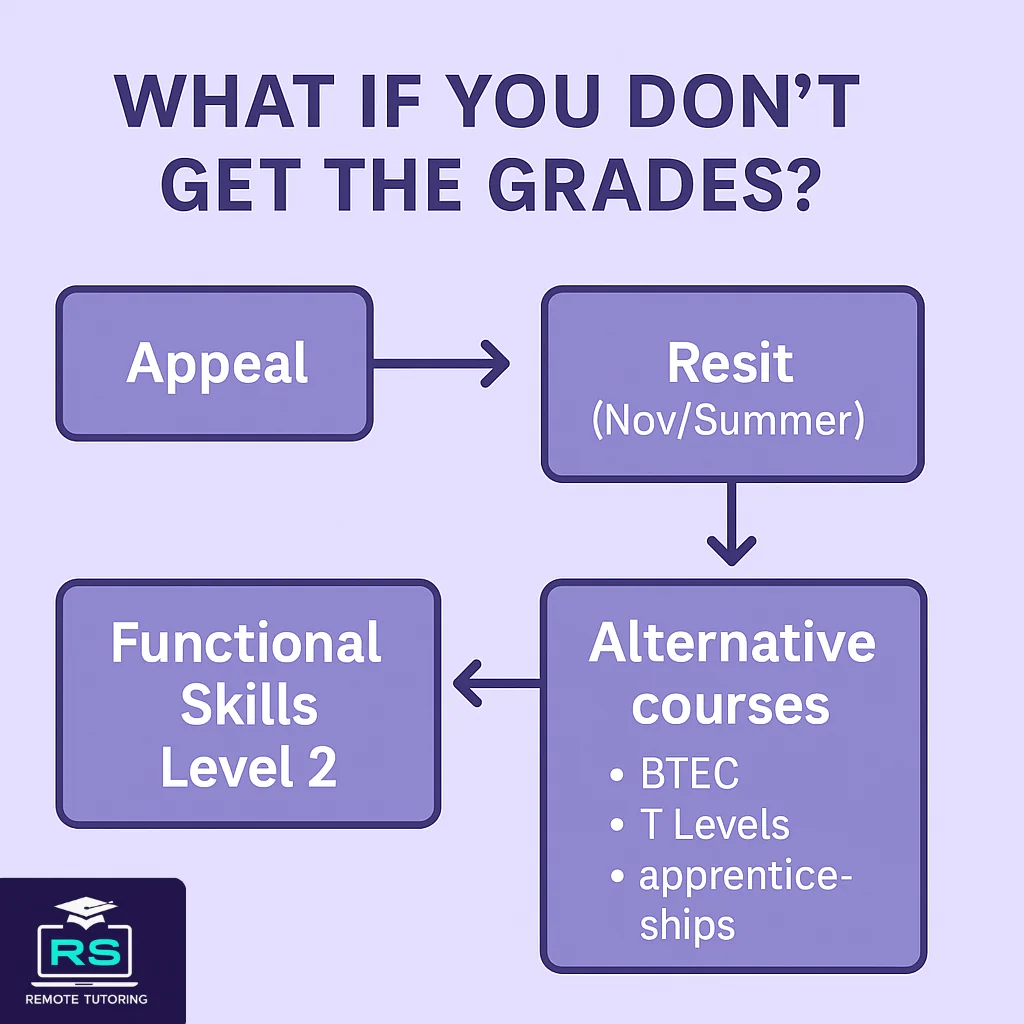
- Talk to school/college about appeals (clerical checks/remark).
- GCSE Resits: English Language and Maths have a November 2025 series; other subjects next summer.
- Alternatives: Functional Skills Level 2 (English/Maths) is accepted for many jobs/apprenticeships and some courses.
- Pathway changes: Consider BTECs/T Levels or a different subject combination at college.
We’ve got a full guide: GCSE Resits 2025: Dates, Rules & How to Prepare.
Book a Free 1-on-1 Session with Our Tutor and Get Best Grades in Resit
- Best tutors in the UK
- Personalized learning plans
- Flexible online scheduling
Choosing GCSE Options: A Quick Checklist
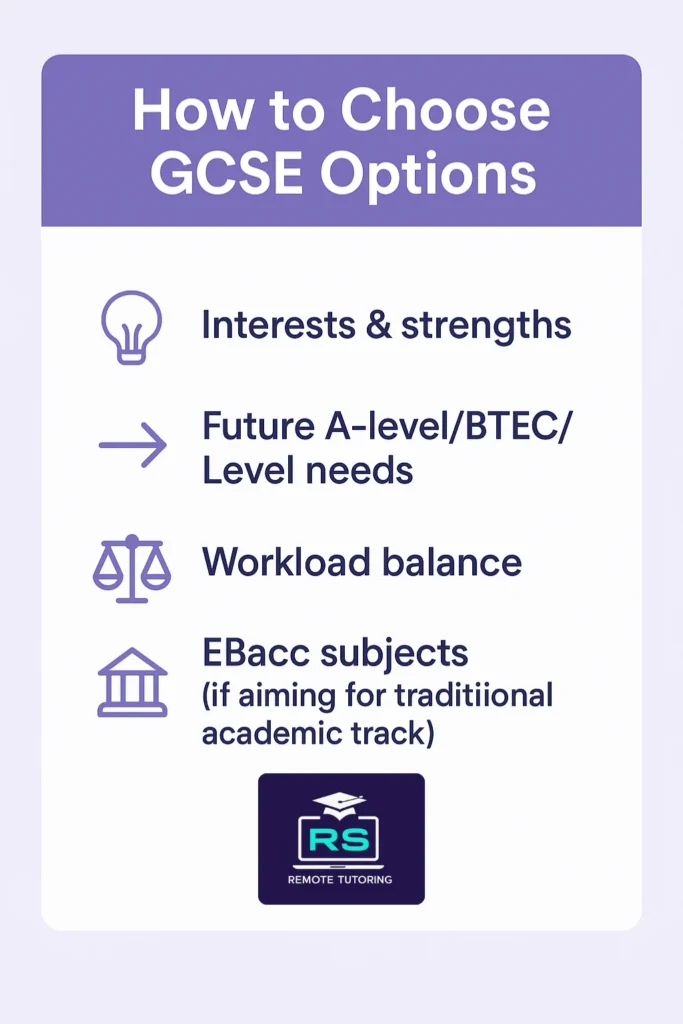
- Interests & strengths: You will study these for two years, pick what motivates you.
- Plans: Check A-level/BTEC/T Level prerequisites and sixth form/college entry rules.
- Workload: Spread reading-heavy, practical, and quantitative subjects sensibly.
- Language advantage: A modern foreign language can strengthen applications.
- EBacc? Helpful if you’re aiming for a traditional academic profile.
How to Prepare for GCSE
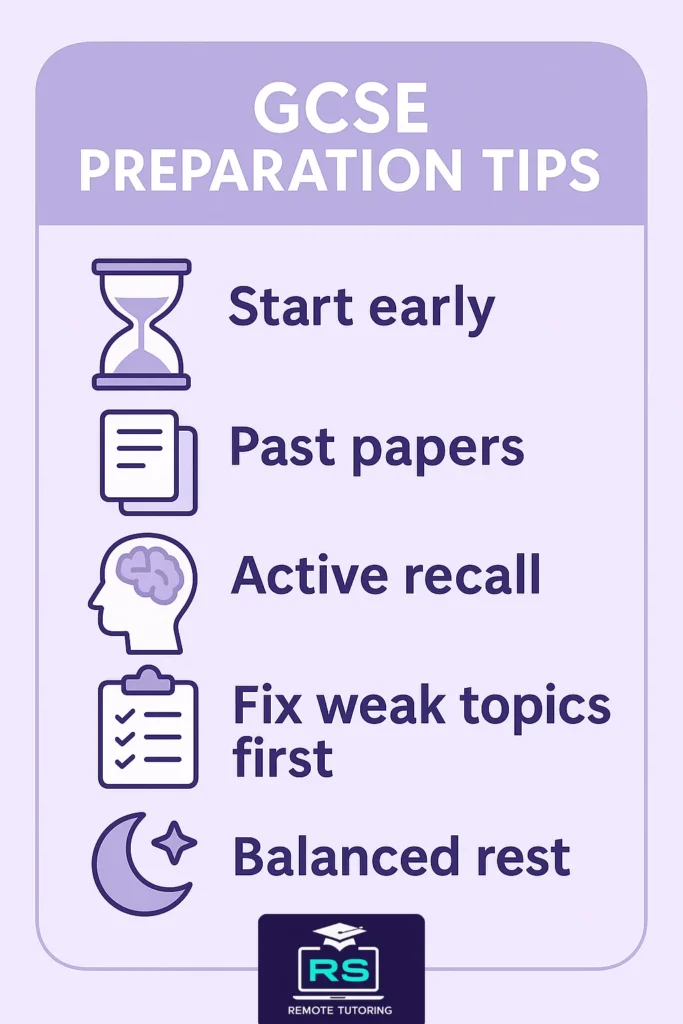
- Start early: Build a light, routine from Year 10; intensify in Year 11.
- Past papers + mark schemes: The most powerful tool, aim for timed conditions.
- Active recall & spaced practice: Flashcards, quick quizzes, teach-back.
- Fix weak topics first: Targeted sessions beat blanket reading
- Healthy habits: Sleep, nutrition, movement, brain needs them.
- Ask for help: Teachers, revision classes, or one-to-one tutoring if you’re stuck.
FAQs
How do GCSEs work in England vs Wales vs Northern Ireland?
England uses 9 to 1 grading; Wales and Northern Ireland mainly use A–G* (NI also has C*). Some schools in Wales/NI may enter pupils for English boards using 9 to 1.
What is a pass at GCSE?
In England, Grade 4 is a standard pass and Grade 5 a strong pass. In lettered systems, Grade C is usually the pass benchmark.
How many GCSEs do you need?
It varies by sixth form/college. Many ask for around 5 passes including English and Maths, with higher grades for certain A-levels.
Can you take GCSEs early or as an adult?
Yes. High-achieving pupils sometimes sit a subject early; adults can study via evening classes, online providers, or as private candidates.
What’s the difference between GCSE and IGCSE?
Both are Level 2 qualifications. IGCSEs are internationally offered and often have exam-only routes (useful for private candidates). Recognition is broad, but always check your destination course’s requirements.
GCSE Key Takeaways
- GCSEs = End of Key Stage 4 (foundation for post-16 route)
- Assessment = Main exams plus NEA in certain subjects
- Grading differs by region (9–1 in England, A*–G in Wales/NI)
- Results day 2025: 21 August 2025
- Did not get the grade? Consider appeals, resits, or Functional Skills.

Raja specializes in Physics and Maths, with over 5 years of experience. He offers KS2, KS3, and GCSE Science and Maths lessons. He graduated from one of the top universities in the UK.

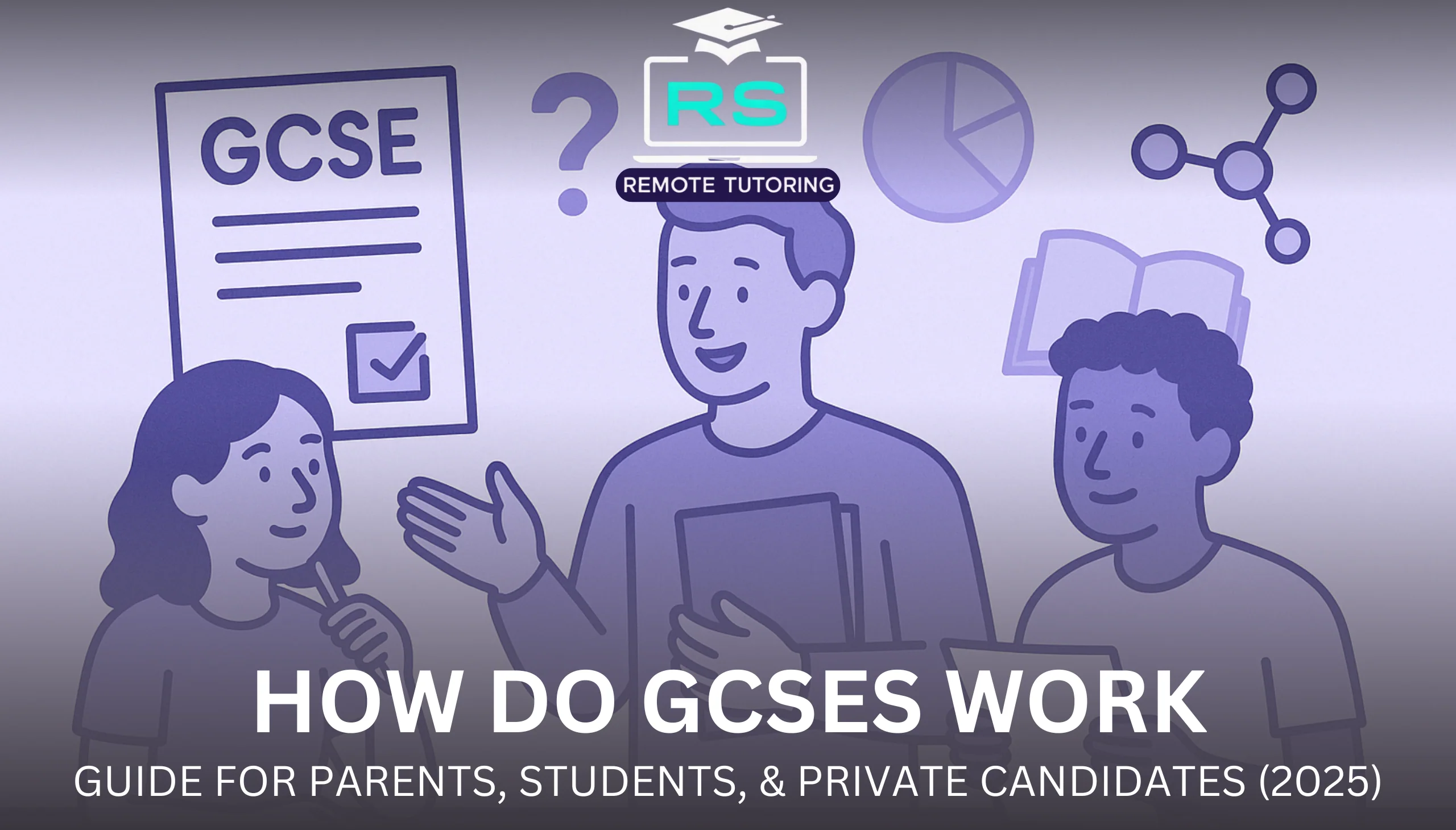
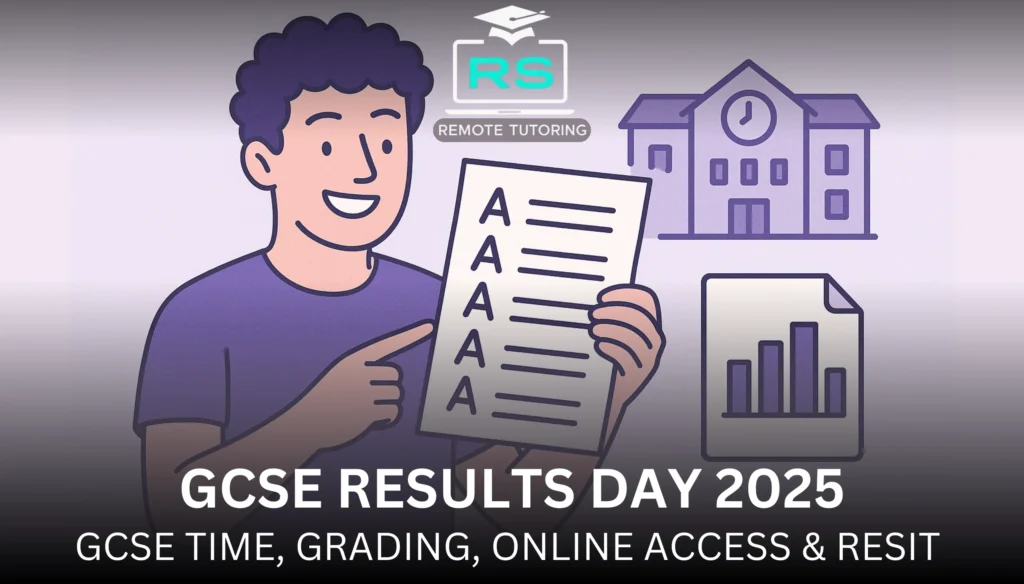
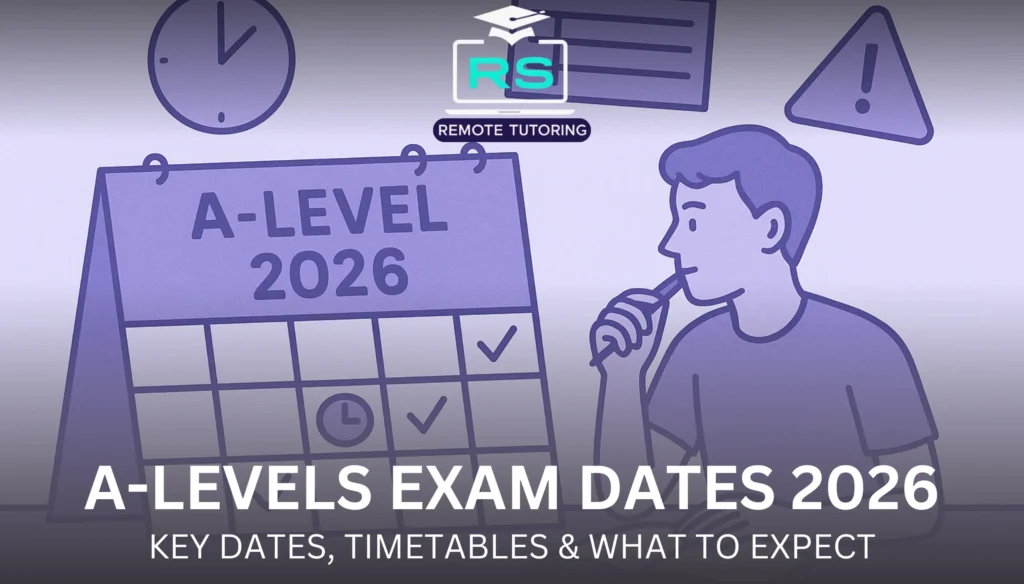
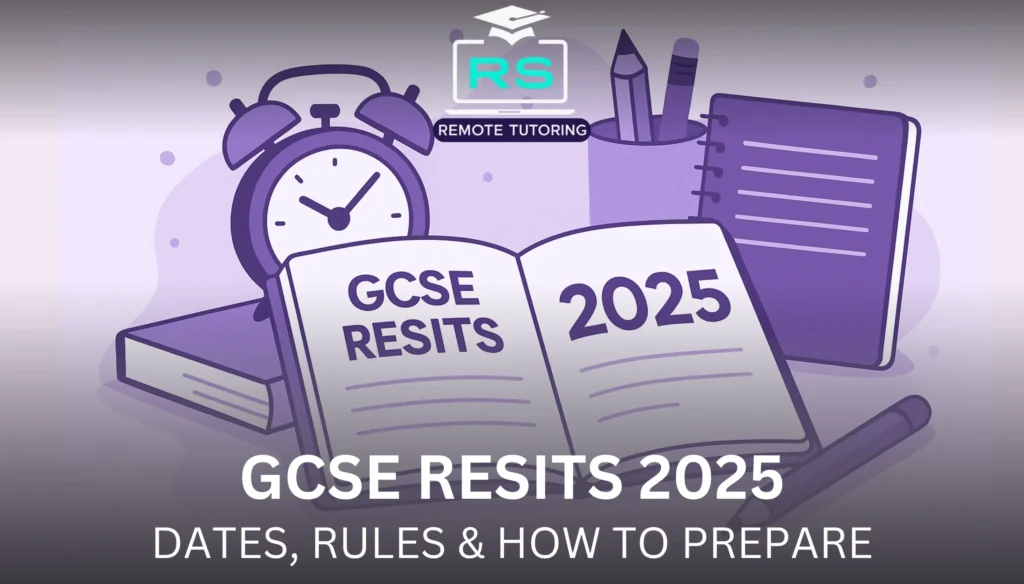
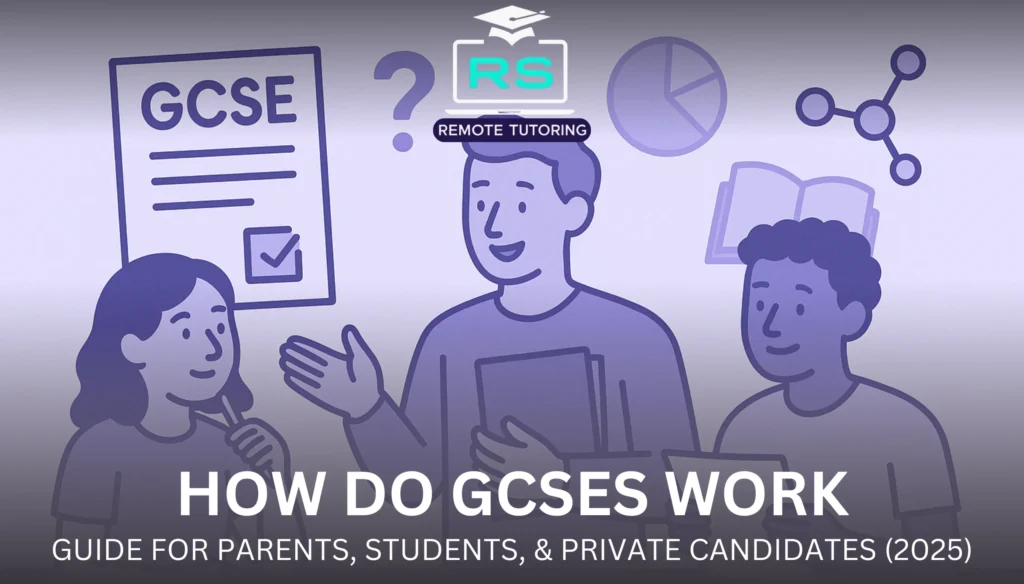




1 Comment
[…] craft their own programmes or follow alternative qualifications like functional skills. However, GCSEs remain the UK’s most widely recognised benchmark at age 16. Universities, colleges and many […]